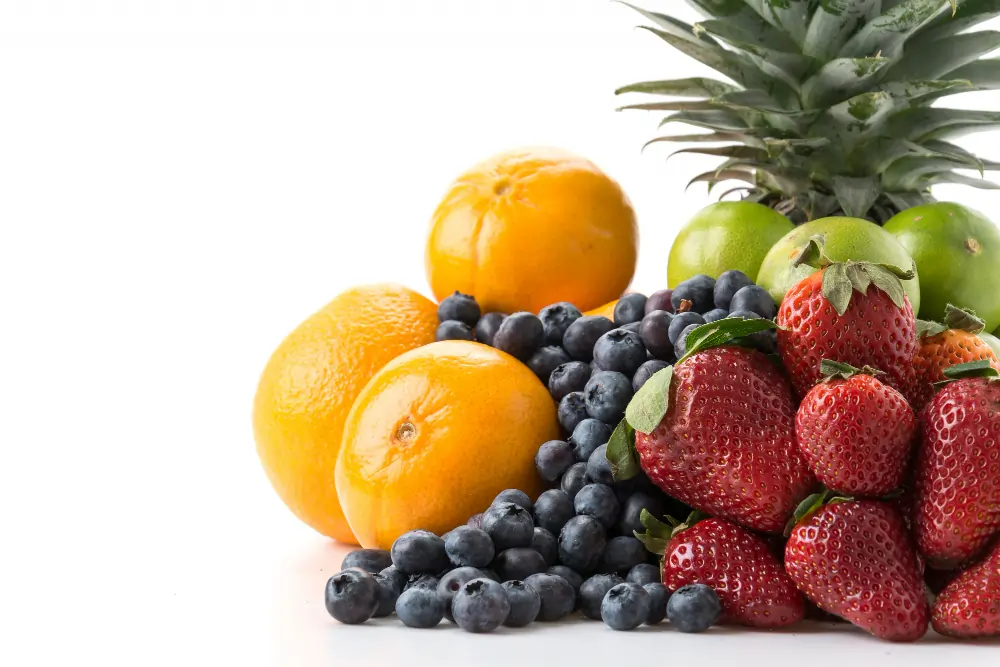
Summer is here, and the scorching heat often leaves us feeling dehydrated and drained of energy. Thankfully, nature has provided us with an abundance of delicious and nutrient-packed fruits that keep us cool, refreshed, and hydrated during the hot summer months. Adding these fruits to your diet not only satisfies your taste buds but also provides essential vitamins, minerals, and antioxidants that promote overall health. In this article, we will explore the top 20 summer fruits and uncover their amazing benefits.
Watermelon
Description and taste: Watermelon, with its juicy and refreshing flesh, is a quintessential summer fruit. Its vibrant pink or red interior is extraordinarily sweet, and the sheer juiciness instantly quenches your thirst.
Nutritional value: Watermelon is a low-calorie fruit that is high in water content. It is rich in vitamins A and C, as well as lycopene, which acts as a powerful antioxidant.
Health benefits: Consuming watermelon helps promote hydration, supports heart health, aids digestion, and replenishes electrolytes. Additionally, it offers sun protection for your skin, thanks to its high lycopene content.
Pineapple
Description and taste: Pineapple, with its tropical and tangy flavor, is a favorite among many. The juicy yellow flesh has a perfect balance of sweetness and tartness.
Nutritional value: Pineapple contains bromelain, an enzyme that aids digestion. It is also a good source of vitamin C, manganese, and antioxidants that boost the immune system.
Health benefits: Regular consumption of pineapple aids digestion, reduces inflammation, strengthens bones, and improves oral health by promoting gum health and preventing plaque formation.
Mango
Description and taste: The king of fruits, mango, delights us with its rich, sweet flavor and buttery texture. Its vibrant colors range from yellow and orange to red and green.
Nutritional value: Mangoes are packed with vitamins A and C, dietary fiber, and antioxidants like beta-carotene. They also contain enzymes that aid digestion.
Health benefits: Mangoes support eye health, boost the immune system, regulate cholesterol levels, aid digestion, and promote brain health. They are also known to improve skin elasticity and give you a natural glow.
Strawberries
Description and taste: Strawberries are small, juicy, and bursting with sweetness. Their bright red color and irresistible aroma make them a summer favorite.
Nutritional value: Strawberries are loaded with vitamin C, fiber, and antioxidants. They are also rich in flavonoids, which have anti-inflammatory properties.
Health benefits: Consuming strawberries promotes heart health, regulates blood sugar levels, reduces inflammation, aids in weight management, and supports healthy brain function.
Papaya
Description and taste: Papaya, with its vibrant orange flesh and sweet tropical flavor, is a tropical fruit that brings a taste of the exotic to your plate.
Nutritional value: Papaya is an excellent source of vitamins A and C, folate, and dietary fiber. It also contains an enzyme called papain, which aids digestion.
Health benefits: Papaya supports healthy digestion, boosts the immune system, aids wound healing, improves skin health, and may have anticancer properties.
Kiwi
Description and taste: Kiwi, with its fuzzy brown exterior and bright green flesh filled with tiny black seeds, offers a refreshing and tangy taste.
Nutritional value: Kiwi is rich in vitamin C, vitamin K, vitamin E, fiber, and antioxidants. It is also a good source of potassium, which helps maintain healthy blood pressure.
Health benefits: Kiwi improves digestion, boosts the immune system, supports heart health, aids in managing blood pressure, and promotes healthy skin with its collagen-boosting properties.
Blueberries
Description and taste: Blueberries, small and packed with flavor, are known for their vibrant blue-purple color and sweet-tart taste.
Nutritional value: Blueberries are a rich source of antioxidants, vitamins C and K, fiber, and manganese. They have one of the highest antioxidant capacities among all fruits.
Health benefits: Consuming blueberries supports brain health, enhances memory and cognitive function, reduces inflammation, improves heart health, and aids in managing blood sugar levels.
Cantaloupe
Description and taste: Cantaloupe has a distinctive netted skin and juicy orange flesh that is sweet, fragrant, and immensely satisfying to eat.
Nutritional value: Cantaloupe is a hydrating fruit and a great source of vitamin A, vitamin C, potassium, and dietary fiber.
Health benefits: Regular consumption of cantaloupe promotes hydration, supports eye health, aids digestion, strengthens the immune system, and helps lower blood pressure.
Oranges
Description and taste: Oranges are renowned for their bright orange color, refreshing citrus scent, and tangy-sweet flavor that wakes up your taste buds.
Nutritional value: Oranges are an excellent source of vitamin C, fiber, and antioxidants like flavonoids and beta-cryptoxanthin.
Health benefits: Oranges boost immune function, improve skin health, aid in wound healing, promote heart health, and help with the absorption of iron from plant-based foods.
Peaches
Description and taste: Peaches, with their fuzzy skin and sweet, juicy flesh, are a true summer delight. The flavors can range from mildly sweet to intensely juicy.
Nutritional value: Peaches are rich in vitamins A and C, dietary fiber, and antioxidants like beta-carotene. They are also a good source of potassium.
Health benefits: Consuming peaches supports skin health, aids digestion, improves heart health, promotes healthy vision, and may have anti-inflammatory properties.
Grapes
Description and taste: Grapes come in various colors like green, red, and black, each with its unique taste. They are small, juicy, and deliciously sweet.
Nutritional value: Grapes are packed with antioxidants, vitamins C and K, fiber, and potassium. They also contain resveratrol, a powerful antioxidant compound.
Health benefits: Grapes support heart health, strengthen the immune system, aid in digestion, promote brain health, and may have anticancer properties.
Cherries
Description and taste: Cherries, with their vibrant colors and juicy flesh, add a burst of sweetness. They come in varieties like sweet cherries and tart cherries.
Nutritional value: Cherries are rich in antioxidants, vitamins A and C, fiber, and melatonin, a hormone that regulates sleep-wake cycles.
Health benefits: Consuming cherries reduces inflammation, aids in sleep regulation, promotes heart health, supports exercise recovery, and may help with pain relief.
Raspberries
Description and taste: Raspberries, with their delicate structure and sweet-tart flavor, are a beloved summer berry. They come in a range of colors, including red, black, and golden.
Nutritional value: Raspberries are low in calories and high in fiber, vitamins C and K, antioxidants, and minerals like manganese.
Health benefits: Raspberries improve digestion, promote heart health, support brain function, have anti-inflammatory properties, and may help manage diabetes.
Blackberries

Description and taste: Blackberries are plump and juicy berries that have a unique sweet and slightly tart taste, making them a delightful summer treat.
Nutritional value: Blackberries are rich in vitamins C and K, fiber, antioxidants, and manganese.
Health benefits: Consuming blackberries supports heart health, aids digestion, boosts the immune system, promotes healthy bones, and may have anticancer properties.
Apricots
Description and taste: Apricots are small, golden-orange fruits with velvety skin and a sweet yet slightly tangy taste.
Nutritional value: Apricots are a rich source of vitamins A and C, potassium, dietary fiber, and antioxidants.
Health benefits: Apricots support eye health, aid digestion, strengthen the immune system, improve skin health, and promote healthy pregnancy.
Plums
Description and taste: Plums come in a variety of colors, including purple, red, and yellow, with a juicy flesh and a mildly sweet to tart taste.
Nutritional value: Plums are rich in vitamins C and K, dietary fiber, antioxidants, and minerals like potassium.
Health benefits: Consuming plums aids digestion, supports bone health, promotes heart health, improves blood sugar control, and may have anti-inflammatory properties.
Coconut
Description and taste: Coconuts are iconic tropical fruits, known for their hard outer shell and refreshing, mildly sweet, and nutty taste.
Nutritional value: Coconuts are a good source of electrolytes, dietary fiber, vitamin C, manganese, and antioxidants.
Health benefits: Coconuts promote hydration, support heart health, aid digestion, boost the immune system, and have antimicrobial properties.
Guava
Description and taste: Guava is a tropical fruit with a distinct fragrance, green or yellow skin, and sweet, tropical flavor.
Nutritional value: Guava is incredibly rich in vitamin C, fiber, antioxidants, and phytochemicals like lycopene.
Health benefits: Consuming guava boosts immune function, aids digestion, supports heart health, promotes healthy skin, and may have anticancer properties.
Conclusion
As we embrace the summer heat, it’s crucial to keep our bodies cool and hydrated. Incorporating these nutrient-packed summer fruits into our daily diet not only adds a burst of flavor and refreshment but also ensures we receive the essential vitamins, minerals, and antioxidants necessary for overall well-being. So grab a bowl of your favorite fruits, beat the heat, and indulge in nature’s beneficial and delicious offerings!
FAQs
1. Can I mix these summer fruits together to create a refreshing fruit salad?
Absolutely! Combining various summer fruits in a fruit salad is a fantastic way to enjoy their flavors and benefits together.
2. Are these fruits suitable for people with dietary restrictions?
Most of these fruits are suitable for various dietary restrictions. However, it’s always best to consult with your healthcare provider if you have specific concerns.
3. Can I consume these fruits if I’m looking to lose weight?
Yes, these fruits are generally low in calories and high in nutritional value, making them suitable for weight loss or weight management goals. Just remember to consider portion sizes and maintain a balanced diet.
4. Are these fruits available throughout the summer season?
Yes, the majority of these fruits are available during the summer season. However, availability may vary depending on your location.
5. Can I freeze these fruits for later use?
Yes, most of these fruits freeze well. Freezing them allows you to enjoy their goodness even when they are out of season. Just make sure to properly wash, peel, and store them in an airtight container before freezing.
We Want to Hear From You on Summer Fruits
Summer is all about enjoying the sun and staying refreshed! Do you have a go-to summer fruit recipe that never fails to cool you down? Or perhaps a clever hack for beating the heat? Share your best tips and favorite fruity creations in the comments below. Let’s make this summer the coolest one yet with your delicious and hydrating ideas!


